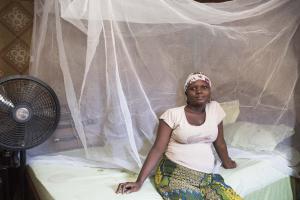Receiving Malaria Intermittent Preventive Treatment in pregnancy saves lives
Abuja April 24, 2021- “I was not aware there was a way I could prevent malaria during pregnancy; I never heard of malaria preventive treatment and I had no mosquito net and unfortunately, I was not attending ante-natal clinic. Maybe if I did, I would have been able to save my baby,” narrates Shafa Magaji, a 24-year-old woman from Gwale Local Government Area (LGA) in Kano State.
Shafa lost her first child, a few days after birth. She had contracted malaria during her pregnancy which led to maternal anemia and the baby turned out very small at birth weighing about 1.8kg. Like elsewhere in Nigeria, she and many women in her city are forced to struggle with the threat of malaria every day; unfortunately, Shafa understands this more than most other women. Shafa works as a domestic house help in one of the houses in a nearby city and has to commute almost 40 Kilometers daily to fend for herself and family.
“I developed fever and chills and could not go to work and my condition worsened within two days. I lost appetite and was extremely thirsty and suffered from headaches and body aches to the point that I could no longer walk. It was then that I decided that I must go to a hospital where I was diagnosed with malaria. At that point, I was far in my pregnancy journey but the doctor prescribed some medications for me, but I still lost the child after birth”
When Shafa became pregnant again, she registered for antenatal care and was able to receive support from her local health center and also received nets treated with insecticide – called Long-Lasting Insecticide-Treated Nets, or LLINs provided by the World Health Organization (WHO) to protect her against mosquito bites.
According to the 2020 World Malaria Report, Nigeria had the highest number of global malaria cases (27 % of global malaria cases) in 2019 and accounted for the highest number of deaths (23 % of global malaria deaths).
Everyone in Nigeria is at risk of malaria, though some areas are of higher risk than others and consequently, Nigeria is one of the two countries with the highest exposure of malaria infection in pregnancy. Only 17% percent of pregnant women received three doses of Intermittent preventive treatment in pregnancy (IPTp) according to the 2018 Malaria Indicator Survey and an estimate of 11% of maternal deaths are due to malaria.
On every April 25, World Malaria Day is commemorated around the world; the theme for this year is “Zero Malaria – Draw the Line Against Malaria” because every malaria case is preventable, and every malaria death is unacceptable. Nigeria as a country adopted the slogan, Stand Up! Take Action! Which calls on everyone to get involved in the fight against malaria.
Malaria has a huge economic impact and is estimated to account for an average annual reduction of 1.3% in Africa’s economic growth, while it is estimated that Malaria-related absenteeism and productivity losses cost Nigeria, for example, an estimated US$ 1.1 billion every year.
“Urgent action is therefore needed to stop the scourge of this disease and to get on track towards the global malaria goals of a 90% reduction in cases and deaths by 2030. This includes investment to expand access to malaria interventions for groups that have been left behind, such as children and pregnant women. Smart deployment is also important to protect the effectiveness of malaria tools, along with innovations to proactively address anticipated challenges” stated WHO Nigeria Country Representative Dr Walter Kazadi Mulombo while sharing the WHO Arica Regional Directors message on World Malaria Day.
He added that “Together, we need to move from the perception of malaria as a health problem, to understanding this disease as a threat to socio-economic development that requires a multisectoral response.”
As a strategic partner of the Federal Ministry of Health (FMoH), WHO provides technical support to National Malaria Elimination Programme (NMEP) to identify, assess, design, implement and monitor malaria in Nigeria.
WHO Nigeria is currently supporting NMEP and partners towards mobilizing resources for Malaria control in Nigeria, and leveraging opportunities that exist through other programs and platforms to improve malaria surveillance, vector control, case management, coordination and efficiency of implementation.
Furthermore, WHO has also developed the High Burden to High Impact (HBHI) approach aimed at enabling countries to rethink the strategies for malaria control and elimination. This process provided the right impetus for the development of the current Nigeria malaria strategic plan, which provides clear direction towards using stratified and evidence-based information to drive impact, through a combination of tailored interventions that work, in the context of sustainable and resilient health system.
Technical contacts:
Dr Jean Baptiste, Anne Eudes. Email: jeana [at] who.int (jeana[at]who[dot]int); Tel: +234 813 173 6281
Dr Lynda Ozor; Email: ozorl [at] who.int (ozorl[at]who[dot]int); Tel: +234 803 402 0832



